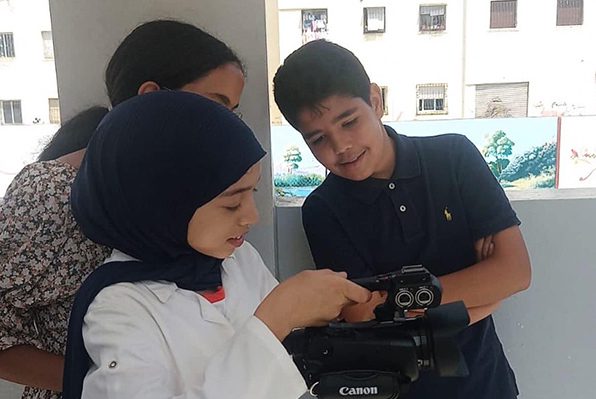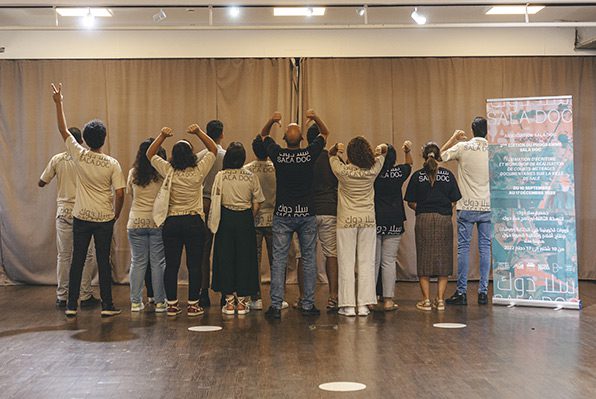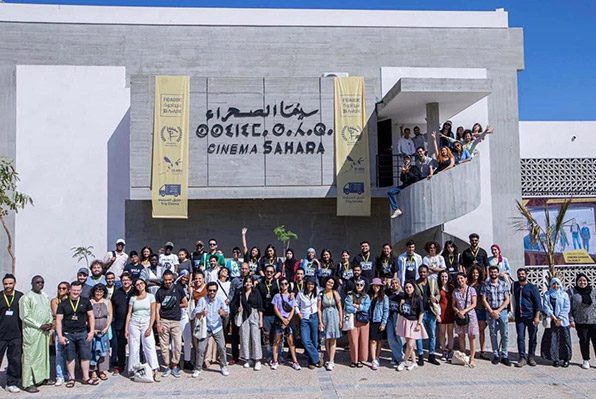Sala Doc: Breathing cultural life back into Salé
In the city of Salé, on the north bank of the Bouregreg river which separates it from Rabat, the young filmmaker Hatim Jarir embarked on a mission to breathe life back into his beloved hometown. Born out of his passion for cinema and deep connection to Salé, Hatim founded a transformative project, Sala Doc. This project increased its impact and has a sustainable future thanks to the support of the EU-funded Safir Project.

The essence and impact of a transformative initiative
In 2020, amidst the global pandemic, Hatim Jarir returned to Salé after years of travelling, pursuing his dreams as a filmmaker. As he explored the city that held his roots, he couldn’t help but notice the lack of a vibrant cultural landscape. The artistic life had faded, leaving the youth without many opportunities for expression and growth. “Salé is a beautiful city, with such a rich culture and history, but it’s overshadowed by Rabat, being so close it’s considered a suburb.” Hatim explains, adding, “This historic city doesn’t have much of a cultural and artistic life.”
This was the inspiration behind Sala Doc, an annual training programme for writing and directing short documentaries about Salé and its people. The project aims to boost the development of documentary film culture among youth, allowing them to share their unique perspectives on the city they call home. Hatim thought that in the same way he started from an opportunity in Salé, other youth with potential should have the same chance.
Every August, Sala Doc opens its doors to aspiring filmmakers through an open call for candidates. Those selected then go through training on the aesthetics, writing techniques, and technical aspects of documentary filmmaking that end with them making their short documentary. Hatim and his team also provide individual mentorship, assigning a mentor to each aspiring filmmaker. Additionally, a professional videographer offers continuous feedback, helping the participants craft their unique stories. After months of effort, the annual programme (now in its 3rd edition) culminates in a public screening of the short films produced by the participants.
Sala Doc’s competition winners are granted automatic participation in the renowned Agadir International Documentary Film Festival (FIDADOC), the first Moroccan cinematographic event exclusively dedicated to documentary films. Just by being there, they have the opportunity to meet the best of the best in the documentary film world. This experience opens doors for growth in their filmmaking careers. “Even if they don’t win anything, it’s a unique networking opportunity where our youth can blossom into filmmakers,” Hatim says.
“Meeting professionals and other amateur filmmakers, watching documentaries together and listening to ideas is an important first step in making your first documentary. Sala Doc offered me that !” says Imrane Rahani, winner of the 3rd edition of Sala Doc.
Along with his Sala Doc project, Hatim was among the 1,000 young individuals in the region supported by Safir to contribute to the Sustainable Development Goals and drive meaningful change. Hatim benefited from training and support sessions provided by a network of knowledgeable local incubators throughout the past year. This assistance equipped him with the necessary tools to impact his community positively. With Sala Doc’s work, Salé transformed into a city that celebrated its cultural heritage, nurtured the creative spirit of its youth, and gave voice to the stories that had long been overlooked.

Capturing the soul of Sala in documentary filmmaking
Sala Doc’s team ensures a link between the films it supports and the city of Salé. Each documentary is woven with the life, landscape, and history of the city. Hatim emphasises that the stories can be diverse as long as they have a meaningful link to Salé, whether through personal narratives, family history, or the history of specific places.
Furthermore, Sala Doc embraces diversity and inclusivity. It doesn’t matter if an individual was born in Salé, has ancestral ties to the city, or is simply a resident —what truly matters is their connection to Salé and their talent. Hatim highlights the example of a participant from the south of Morocco, who had only been living in Salé for a year. Despite his relatively short time in the city, he crafted a captivating documentary called “The Memory of Water.” This film celebrated the public fountains of Salé’s Medina, exploring their beauty and historical significance. It was a tribute to his newfound home.
That is what Sala Doc does, using short documentaries to illuminate the history and rich cultural heritage of Salé through the lives of its people and the essence of its places. Sala Doc instils a sense of pride and awareness among the youth, reminding them of the beauty that resides in their heritage.
Ciné-Madrassa: Mentorship and Film Education for Youth
To reach more young beneficiaries , the project introduced an innovative initiative known as Ciné-Madrassa, a workshop programme tailored for secondary school students. The students participate in age-appropriate workshops and attend film screenings, introducing them to the world of documentaries and cinematographic culture.
The winners of Sala Doc’s competition are the trainers who provide workshops for Ciné-Madrassa. These talented young individuals share their knowledge and expertise and play their own movies for the children. This ensures that Sala Doc participants later have the opportunity to earn a livelihood so they can thrive in their city, gaining skills that would support them on their filmmaking journey. This virtuous cycle of mentorship and growth not only empowers the youngest generation but also creates a sustainable pathway for the older ones to build successful careers within their community.
Looking towards the future, Hatim has great ambitions for Ciné-Madrassa. With the new school year on the horizon, the project aims to reach at least 400 students. The objective is to create a dynamic space, a sanctuary where the flame of documentary filmmaking could be passed on, lighting the way for future generations of storytellers and active citizens.

Expanding horizons: Sala Doc’s Vision for sustainability and expansion
Hatim also envisions Sala Doc expanding to other cities in the region, recognising its potential impact on communities deprived of cultural spaces. “Through SAFIR, I met so many others from the region with similar ideas and projects, and we have collaborations in the works.” Hatim explained. In particular, he participated in The Safir Social Entrepreneurship Forum. The forum, held in Casablanca, brought together over 200 participants, all supported by Safir for their entrepreneurial, media, or associative projects.
Hatim stresses the importance of structured support. This is where the European Union’s Safir project played a pivotal role. The project provided invaluable guidance and resources to Hatim, allowing him to transform Sala Doc into an association and expand its reach. The six-month incubation programme helped him better manage the project, refine its internal organisation, and grow his team. With Safir’s support, Sala Doc became an even more vital force for change.
The project
Safir is an EU-funded project focused on achieving the Sustainable Development Goals (SDGs) and promoting socio-economic inclusion for young people in North Africa and the Middle East. By providing resources and funding, Safir empowers young people to contribute to the SDGs actively and become agents of change. Through initiation and support sessions, local incubators, and civil society organisations, Safir offers training and opportunities for advocacy, networking, and participation in decision-making processes. The project supports 20 civil society organisations, established 18 innovative spaces in higher education and research institutions, connected 7 local incubators, and benefited 1,000 young project leaders from 9 countries in the region.




























 Syria
Syria 


